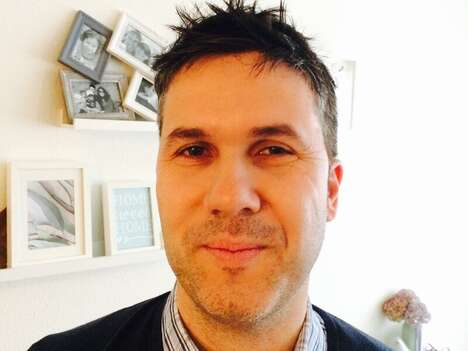Breaking Biases with Diversity
Craig Tiley, CEO at Tennis Australia
 Craig Tiley, the CEO at Tennis Australia, spoke with Trend Hunter about how his company keeps creative thinking flowing, the positive results of having women in leadership roles, and what the industry will look 10 years down the road.
Craig Tiley, the CEO at Tennis Australia, spoke with Trend Hunter about how his company keeps creative thinking flowing, the positive results of having women in leadership roles, and what the industry will look 10 years down the road. What can you tell us about your role at Tennis Australia?
Tennis Australia is a company of about 500 full-time employees and about 9,000 seasonal employees. We run approximately 300 events per year. We’re a sporting event and entertainment company, as well a production and broadcasting company. I’ve been CEO for a little over three years now, and prior to that, I was the Tournament Director for the Australian Open, which is a position that I still maintain. A lot of the success of our business hinges on innovation and a knowledge of what’s going to be popular in the future.
How does your team generate great ideas? Do you have certain rituals to make creativity happen?
We have a very open and transparent type of business. Our work environment is really beautiful, we’re in an 8-storey building that has wall-to-ceiling windows overlooking our entire venue and park area. The workspaces are open, which encourages more collaboration. We don't operate in separate offices so that we can maximize communication. We like to bring people together in groups frequently to share ideas.
Recently, we finished what’s called a “playbook,” where the company spends a whole day presenting different ideas with a business model to support them. From that, we’ve picked up some really magnificent ideas. Having a diverse workforce is really conducive to coming up with great ideas as well, I have a personal passion for gender balance particularly, and having women in positions of leadership. At every level of our business, we aim to maintain this.
What are some barriers to innovation? How do you get around them?
Execution can be a barrier to innovation, as it can sometimes be difficult to ensure that an idea is successfully moved forward. Another barrier is the fear of the unknown. Often, people are afraid to take risks so they just default to what they know and what they’re comfortable with. The third barrier is bias, as everyone has some form of bias that can sometimes be hard to avoid, especially if it’s shared with others in a group. This is why diversity is so important, because it prevents these biases from negatively affecting the innovation process, and ensures that there’s more perspectives coming into play.
How do you identify trends? What resources does your team use to spot trends and insights?
Spending time at events like Future Festival, talking to futurists, our own data analytics team, doing regression analysis on the data, and just being aware of what others are saying and doing helps us in identifying trends. Because we’re a business that delivers events, we have to plan now for what’s going to happen tomorrow. We have to build facilitates that will match an environment that’s years ahead of where we are now. There’s so many things that can change and you just have to be adaptable.
What do you think your industry will look like in 10 years?
I think it’ll be all about the entertainment aspect and the experience, and it will be very individualized as we provide live sports content to fans. Each fan will have their own needs and we’ve got to be able to customize that for our in-stadium experience by providing personalized food options, access to wifi, apps and more.
Then there’s the broadcasted experience as well, which also needs to be individualized. This might mean having conversations with commentators, or being able to predict physiological responses to pressure. I think it’s going to be customized to the needs of the consumer, and we’ll have to adjust our product delivery to adapt to this. In addition, consumers will have less time, so we’ll have to find new ways to engage with them for longer periods of time.
Thirdly, I think the sport of tennis with shift significantly, and you’ll see different formats and scoring systems arise.
Has there ever been an instance where another industry has influenced an innovation at your company?
I think the tech industry has. The data that we have access to and are able to analyze wouldn't be possible without successful startups. Our own ability to become a production house has really affected us, as it's made the whole delivery of live sports so much more seamless.
What’s the most unconventional thing you have done to get creative inspiration?
I’m a big believer of taking people out of their normal environment, so once or twice a year we do something that’s just bizarre. One thing we’ve done is take everyone as high as we can in a hot air balloon and then just look down at the world. From there, we find out what ideas they have about what they can see. Another example is when we’ve gone horseback riding in the outback, or gone on a hike to bring people together and take them out of their comfort zone.
We’ve done role playing excursions as well, to explore new ways of thinking. As an organization, we do a lot of things by video. An example of something we’ve done recently is a program called “Pay It Forward,” where we give everyone $1,000 and at the end of the year we give them a very big financial reward if they’ve taken that money and spread it further and to have an impact on improving people’s lives. One woman on our team put her $1,000 to building a village in Rwanda for those who didn't have homes. She used the money to raise money from the government and made more, created fundraisers and just kept building. With that, she was able to hire a few hundred people and build an entire village. This fosters a culture of giving and gives people the chance to share some really incredible stories.
References: tennis.au, theaustralian.au
Featured Articles

Adventuring for the Brand
Tasha Sheridan, Strategy Consultant at 1HQ

Seeing Patterns Anew
Daniela Querqui, Freelance Consultant, Consumer-Centric Insights & Innovation

From Risk to Reward
Alexandre Bastos, Global Director of Innovation at Givaudan

Managing Creative Chaos
Emily Beckmann, Concept Creative & Communications Manager at Merlin

Connections that Spur Innovation
Ed Matesevac, Innovation Analyst at State Farm

The Value of Non-Hierarchical Offices
Marketing Director at Ikon Arts Foundation, Linda Mateljan

Speeding Up Innovation
Pauline Decroos, Senior Consumer Insights Manager at Bel Brands

Fostering Hispanic Values
Anabella Herrera, Strategy and Insights Manager at Univision

Learning Through Risk
Rachael Schwartz, General Manager at Keurig Connect